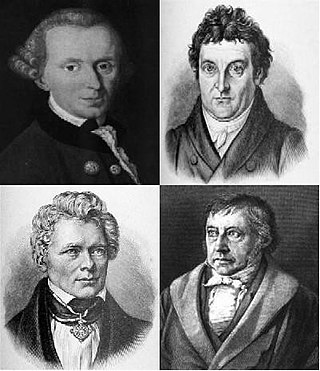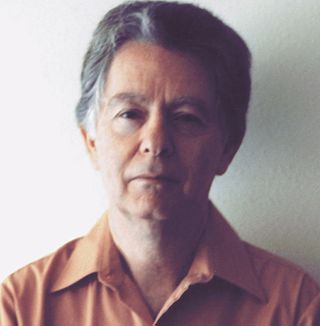
Immanuel Kant was a German philosopher and one of the central Enlightenment thinkers. Born in Königsberg, Kant's comprehensive and systematic works in epistemology, metaphysics, ethics, and aesthetics have made him one of the most influential and controversial figures in modern Western philosophy, being called the "father of modern ethics", the "father of modern aesthetics", and for bringing together rationalism and empiricism earned the title of "father of modern philosophy".
In its most common sense, philosophical methodology is the field of inquiry studying the methods used to do philosophy. But the term can also refer to the methods themselves. It may be understood in a wide sense as the general study of principles used for theory selection, or in a more narrow sense as the study of ways of conducting one's research and theorizing with the goal of acquiring philosophical knowledge. Philosophical methodology investigates both descriptive issues, such as which methods actually have been used by philosophers, and normative issues, such as which methods should be used or how to do good philosophy.

German idealism is a philosophical movement that emerged in Germany in the late 18th and early 19th centuries. It developed out of the work of Immanuel Kant in the 1780s and 1790s, and was closely linked both with Romanticism and the revolutionary politics of the Enlightenment. The period of German idealism after Kant is also known as post-Kantian idealism or simply post-Kantianism. One scheme divides German idealists into transcendental idealists, associated with Kant and Fichte, and absolute idealists, associated with Schelling and Hegel.
Fideism is a term used to name a standpoint or an epistemological theory which maintains that faith is independent of reason, or that reason and faith are hostile to each other and faith is superior at arriving at particular truths. The word fideism comes from fides, the Latin word for faith, and literally means "faith-ism". Philosophers have identified a number of different forms of fideism. Strict fideists hold that reason has no place in discovering theological truths, while moderate fideists hold that though some truth can be known by reason, faith stands above reason.

The Critique of Pure Reason is a book by the German philosopher Immanuel Kant, in which the author seeks to determine the limits and scope of metaphysics. Also referred to as Kant's "First Critique", it was followed by his Critique of Practical Reason (1788) and Critique of Judgment (1790). In the preface to the first edition, Kant explains that by a "critique of pure reason" he means a critique "of the faculty of reason in general, in respect of all knowledge after which it may strive independently of all experience" and that he aims to reach a decision about "the possibility or impossibility of metaphysics". The term "critique" is understood to mean a systematic analysis in this context, rather than the colloquial sense of the term.
Critique is a method of disciplined, systematic study of a written or oral discourse. Although critique is commonly understood as fault finding and negative judgment, it can also involve merit recognition, and in the philosophical tradition it also means a methodical practice of doubt. The contemporary sense of critique has been largely influenced by the Enlightenment critique of prejudice and authority, which championed the emancipation and autonomy from religious and political authorities.

Transcendental idealism is a philosophical system founded by German philosopher Immanuel Kant in the 18th century. Kant's epistemological program is found throughout his Critique of Pure Reason (1781). By transcendental Kant means that his philosophical approach to knowledge transcends mere consideration of sensory evidence and requires an understanding of the mind's innate modes of processing that sensory evidence.
In philosophy, transcendence is the basic ground concept from the word's literal meaning, of climbing or going beyond, albeit with varying connotations in its different historical and cultural stages. It includes philosophies, systems, and approaches that describe the fundamental structures of being, not as an ontology, but as the framework of emergence and validation of knowledge of being. These definitions are generally grounded in reason and empirical observation and seek to provide a framework for understanding the world that is not reliant on religious beliefs or supernatural forces. "Transcendental" is a word derived from the scholastic, designating the extra-categorical attributes of beings.

In Kantian philosophy, a transcendental schema is the procedural rule by which a category or pure, non-empirical concept is associated with a sense impression. A private, subjective intuition is thereby discursively thought to be a representation of an external object. Transcendental schemata are supposedly produced by the imagination in relation to time.
Ontotheology means the ontology of God and/or the theology of being. While the term was first used by Immanuel Kant, it has only come into broader philosophical parlance with the significance it took for Martin Heidegger's later thought. While, for Heidegger, the term is used to critique the whole tradition of 'Western metaphysics', much recent scholarship has sought to question whether 'ontotheology' developed at a certain point in the metaphysical tradition, with many seeking to equate the development of 'ontotheological' thinking with the development of modernity, and Duns Scotus often being cited as the first 'ontotheologian'.
A priori and a posteriori are Latin phrases used in philosophy to distinguish types of knowledge, justification, or argument by their reliance on experience. A priori knowledge is independent from any experience. Examples include mathematics, tautologies and deduction from pure reason. A posteriori knowledge depends on empirical evidence. Examples include most fields of science and aspects of personal knowledge.
A transcendental argument is a kind of deductive argument that appeals to the necessary conditions that make argumentation itself possible. Transcendental arguments may have additional standards of justification that are more demanding than those of traditional deductive arguments.
The following outline is provided as an overview of and topical guide to metaphysics:
World disclosure refers to how things become intelligible and meaningfully relevant to human beings, by virtue of being part of an ontological world – i.e., a pre-interpreted and holistically structured background of meaning. This understanding is said to be first disclosed to human beings through their practical day-to-day encounters with others, with things in the world, and through language.
Transcendental humanism in philosophy considers humans as simultaneously the originator of meaning, and subject to a larger ultimate truth that exists beyond the human realm (transcendence). The philosophy suggests that the humanistic approach is guided by “accuracy, truth, discovery, and objectivity” that transcends or exists apart from subjectivity.
Patricia W. Kitcher is the Roberta and William Campbell Professor of Philosophy at Columbia University, widely known for her work on Immanuel Kant and on philosophy of psychology. She has held many positions at different universities, is a founding chair of a committee at the University of California, and has a lead role in multiple professional organizations. Kitcher's most notable interests throughout her career regard cognition and Kantian ethics. She is the author of multiple papers and two books.
Béatrice Longuenesse is a French philosopher and academic, who is the Silver Professor of Philosophy Emerita at New York University. Her work focuses on Immanuel Kant, Georg Wilhelm Friedrich Hegel, and the philosophy of mind. She is a fellow of the American Academy of Arts and Sciences. Longuenesse is one of the most prominent living Kant scholars, and her works have generated significant discussion around parts of Kant's corpus that were previously largely overlooked.

In philosophy, naturalism is the idea that only natural laws and forces operate in the universe. In its primary sense, it is also known as ontological naturalism, metaphysical naturalism, pure naturalism, philosophical naturalism and antisupernaturalism. "Ontological" refers to ontology, the philosophical study of what exists. Philosophers often treat naturalism as equivalent to materialism.

Steven James Bartlett is an American philosopher and psychologist notable for his studies in epistemology and the theory of reflexivity, and for his work on the psychology of human aggression and destructiveness, and the shortcomings of psychological normality. His findings challenge the assumption that psychological normality should serve as a standard for good mental health. He is the author or editor of more than 20 books and research monographs as well as many papers published in professional journals in the fields of epistemology, psychology, mathematical logic, and philosophy of science.
Definitions of philosophy aim at determining what all forms of philosophy have in common and how to distinguish philosophy from other disciplines. Many different definitions have been proposed but there is very little agreement on which is the right one. Some general characteristics of philosophy are widely accepted, for example, that it is a form of rational inquiry that is systematic, critical, and tends to reflect on its own methods. But such characteristics are usually too vague to give a proper definition of philosophy. Many of the more concrete definitions are very controversial, often because they are revisionary in that they deny the label philosophy to various subdisciplines for which it is normally used. Such definitions are usually only accepted by philosophers belonging to a specific philosophical movement. One reason for these difficulties is that the meaning of the term "philosophy" has changed throughout history: it used to include the sciences as its subdisciplines, which are seen as distinct disciplines in the modern discourse. But even in its contemporary usage, it is still a wide term spanning over many different subfields.






